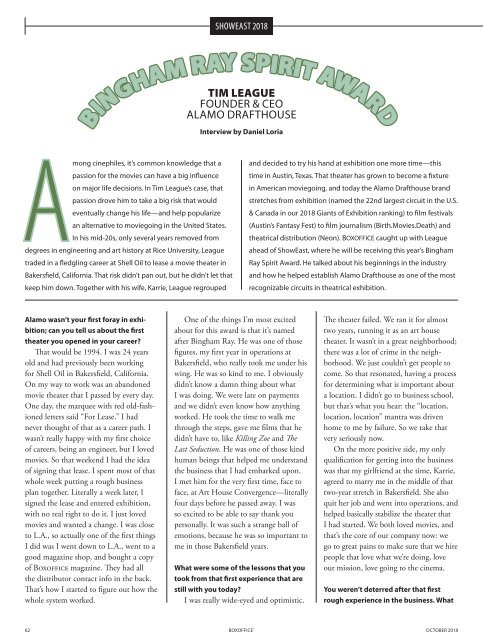Boxoffice - October 2018
The Official Magazine of the National Association of Theatre Owners
The Official Magazine of the National Association of Theatre Owners
Create successful ePaper yourself
Turn your PDF publications into a flip-book with our unique Google optimized e-Paper software.
SHOWEAST <strong>2018</strong><br />
TIM LEAGUE<br />
FOUNDER & CEO<br />
ALAMO DRAFTHOUSE<br />
SPIRIT AWARD<br />
RAY BINGHAM<br />
Interview by Daniel Loria<br />
Among cinephiles, it’s common knowledge that a<br />
passion for the movies can have a big influence<br />
on major life decisions. In Tim League’s case, that<br />
passion drove him to take a big risk that would<br />
eventually change his life—and help popularize<br />
an alternative to moviegoing in the United States.<br />
In his mid-20s, only several years removed from<br />
degrees in engineering and art history at Rice University, League<br />
traded in a fledgling career at Shell Oil to lease a movie theater in<br />
Bakersfield, California. That risk didn’t pan out, but he didn’t let that<br />
keep him down. Together with his wife, Karrie, League regrouped<br />
and decided to try his hand at exhibition one more time—this<br />
time in Austin, Texas. That theater has grown to become a fixture<br />
in American moviegoing, and today the Alamo Drafthouse brand<br />
stretches from exhibition (named the 22nd largest circuit in the U.S.<br />
& Canada in our <strong>2018</strong> Giants of Exhibition ranking) to film festivals<br />
(Austin’s Fantasy Fest) to film journalism (Birth.Movies.Death) and<br />
theatrical distribution (Neon). <strong>Boxoffice</strong> caught up with League<br />
ahead of ShowEast, where he will be receiving this year’s Bingham<br />
Ray Spirit Award. He talked about his beginnings in the industry<br />
and how he helped establish Alamo Drafthouse as one of the most<br />
recognizable circuits in theatrical exhibition.<br />
Alamo wasn’t your first foray in exhibition;<br />
can you tell us about the first<br />
theater you opened in your career?<br />
That would be 1994. I was 24 years<br />
old and had previously been working<br />
for Shell Oil in Bakersfield, California.<br />
On my way to work was an abandoned<br />
movie theater that I passed by every day.<br />
One day, the marquee with red old-fashioned<br />
letters said “For Lease.” I had<br />
never thought of that as a career path. I<br />
wasn’t really happy with my first choice<br />
of careers, being an engineer, but I loved<br />
movies. So that weekend I had the idea<br />
of signing that lease. I spent most of that<br />
whole week putting a rough business<br />
plan together. Literally a week later, I<br />
signed the lease and entered exhibition,<br />
with no real right to do it. I just loved<br />
movies and wanted a change. I was close<br />
to L.A., so actually one of the first things<br />
I did was I went down to L.A., went to a<br />
good magazine shop, and bought a copy<br />
of <strong>Boxoffice</strong> magazine. They had all<br />
the distributor contact info in the back.<br />
That’s how I started to figure out how the<br />
whole system worked.<br />
One of the things I’m most excited<br />
about for this award is that it’s named<br />
after Bingham Ray. He was one of those<br />
figures, my first year in operations at<br />
Bakersfield, who really took me under his<br />
wing. He was so kind to me. I obviously<br />
didn’t know a damn thing about what<br />
I was doing. We were late on payments<br />
and we didn’t even know how anything<br />
worked. He took the time to walk me<br />
through the steps, gave me films that he<br />
didn’t have to, like Killing Zoe and The<br />
Last Seduction. He was one of those kind<br />
human beings that helped me understand<br />
the business that I had embarked upon.<br />
I met him for the very first time, face to<br />
face, at Art House Convergence—literally<br />
four days before he passed away. I was<br />
so excited to be able to say thank you<br />
personally. It was such a strange ball of<br />
emotions, because he was so important to<br />
me in those Bakersfield years.<br />
What were some of the lessons that you<br />
took from that first experience that are<br />
still with you today?<br />
I was really wide-eyed and optimistic.<br />
The theater failed. We ran it for almost<br />
two years, running it as an art house<br />
theater. It wasn’t in a great neighborhood;<br />
there was a lot of crime in the neighborhood.<br />
We just couldn’t get people to<br />
come. So that resonated, having a process<br />
for determining what is important about<br />
a location. I didn’t go to business school,<br />
but that’s what you hear: the “location,<br />
location, location” mantra was driven<br />
home to me by failure. So we take that<br />
very seriously now.<br />
On the more positive side, my only<br />
qualification for getting into the business<br />
was that my girlfriend at the time, Karrie,<br />
agreed to marry me in the middle of that<br />
two-year stretch in Bakersfield. She also<br />
quit her job and went into operations, and<br />
helped basically stabilize the theater that<br />
I had started. We both loved movies, and<br />
that’s the core of our company now: we<br />
go to great pains to make sure that we hire<br />
people that love what we’re doing, love<br />
our mission, love going to the cinema.<br />
You weren’t deterred after that first<br />
rough experience in the business. What<br />
62 BOXOFFICE ® OCTOBER <strong>2018</strong>

















